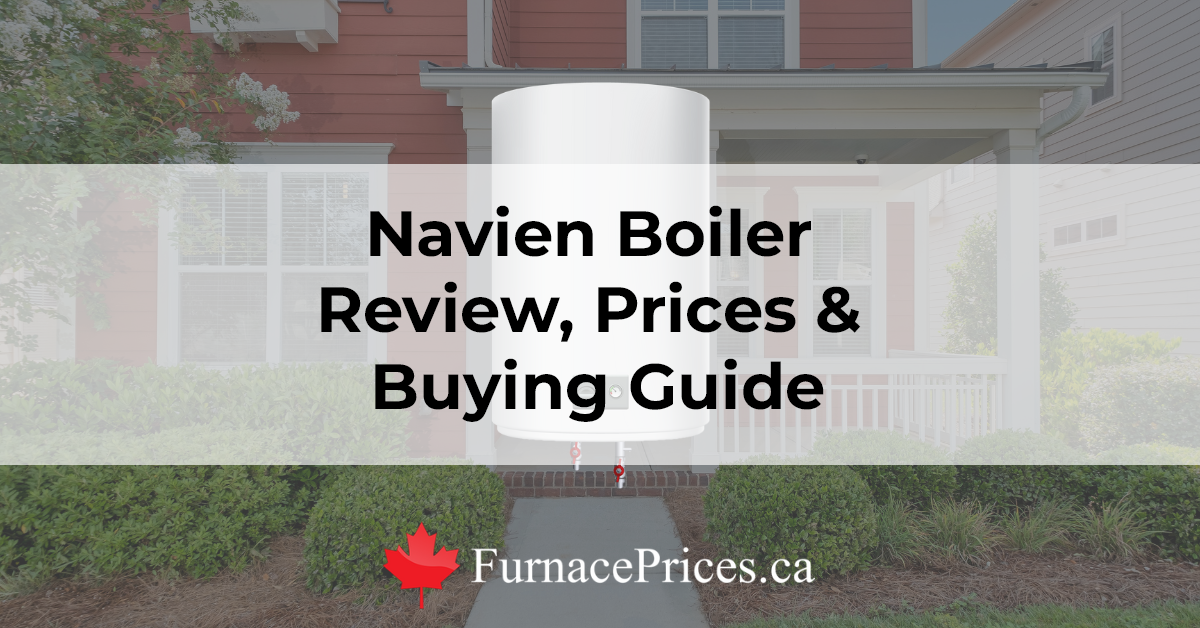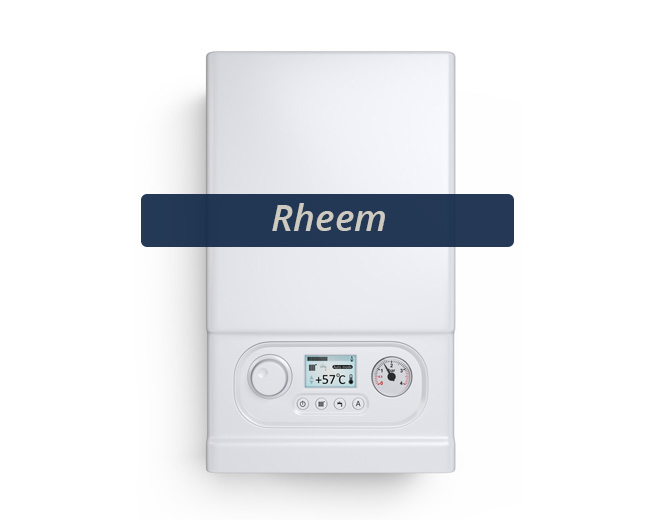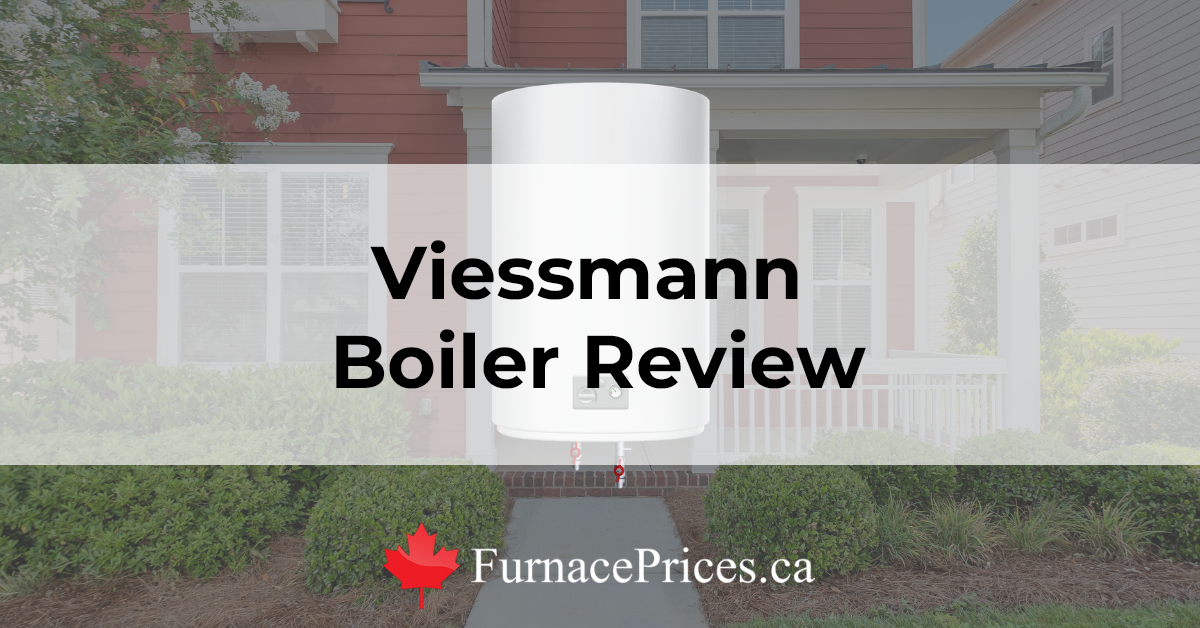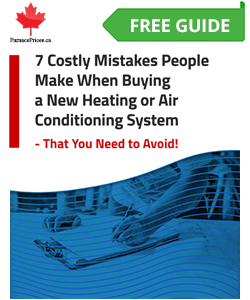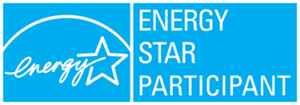A complete Rinnai boiler review and buying guide, including Rinnai’s top models, AFUE ratings, features, model comparisons, warranty information, and more.
This Rinnai boiler review will go over a brief history of the company, as well as what’s good about them and what could be improved. We’ll also evaluate their warranties, describe the features and technologies they have, talk about the types of boilers they manufacture, and compare their different models based on things like features, specifications, and AFUE ratings.
By the end of this guide, you should have all the information you need to decide if a Rinnai boiler is right for your home, and which model might be the most suitable for your budget and your needs.
Also Read: The Best Boilers for Canadians
What's covered in this article?
ToggleThe Bottom Line
Rinnai is overall a great brand when you need a new boiler. Their boilers are well-made, affordable, high-efficiency, condensing heat-only and combi boilers that have AFUE ratings no lower than 95 percent. All the models are ENERGY STAR certified and meet ultra-low NOx emissions standards.
What’s more, Rinnai boilers are all designed with space-saving in mind, and the compact units are versatile and easy to install and maintain. That means they’ll fit in just about any space, and along with saving you money on monthly energy bills, they can also save you on service and labour costs. Plus, every model is backed by a great warranty, so you know the brand is confident in their products.
Rinnai Boiler Review Data from Real Customers

Most homeowners love their Rinnai boilers. They say they’re quiet, reliable, efficient, and have great features. That includes the outdoor reset sensor, which tracks the outdoor temperature and adjusts the system settings automatically. It really works and truly improves efficiency. At the same time, some customers do complain of frequent breakdowns with Rinnai boilers. However, Rinnai boilers are well-made and long-lasting, and most problems can be avoided with professional installation and annual maintenance from a licensed HVAC technician.
Get Quotes
How soon are you looking to buy?*



Rinnai Boiler Cost
$3,200 – $6,300+ (including installation)
As you see from the price range, it’s not really possible to give an accurate estimate for the cost of a new boiler without knowing the specifics. So many things will impact the final cost, including:
- Installation
- The exact make, size, and model
- The boiler type
- How many zones you want
- Special features
- Warranties
- AFUE ratings
- Where you live
We mentioned installation, and while that typically runs about $1,000, it can cost more or less depending on the infrastructure of your home, the type and size of the boiler, where you live, and more.
There are ways to save on the cost of your boiler, and one of them is by looking for rebates. Rebates are available on and off throughout the year from the government, HVAC distributors, manufacturers, and utility companies, and you have to keep an eye out for what’s available from whom.
And remember, while a boiler with a higher AFUE rating might cost more upfront, it could save you that much and plenty more in energy costs over the lifetime of the boiler. In fact, ENERGY STAR boilers use about 10% less energy than standard boilers, and that will translate to cost savings.
Rinnai Boiler Options Reviewed
Heat-Only Condensing Boilers
All Rinnai boilers are condensing, meaning they have a secondary heat exchanger that traps and recycles heat and moisture from the exhaust gasses, thereby increasing efficiency and reducing heat loss.
Rinnai’s heat-only condensing boilers are available in every series. Some of the models are convertible, meaning they can be hooked up to either natural gas or propane, whereas others have a specific fuel source.
All of the boilers in this category have an AFUE rating of at least 95 percent, they all boast ultra-low nitrogen oxide emissions, they’re all ENERGY STAR certified, and they were listed in the past as ENERGY STAR Most Efficient, so they’ll be eligible for most if not all energy-based rebates.
Condensing Combi Boilers
Rinnai’s I and M Series include both heat-only and condensing combi boilers. Combi boilers are great for homeowners who want to get home heating and hot water from one convenient system. What’s more, these combi boilers are also condensing, so the secondary heat exchanger means better efficiency.
Like the other Rinnai boilers, some of their combi boilers are convertible while others are gas or propane only. These models have AFUE ratings up to 95.9 percent, they’re ENERGY STAR certified, have ultra-low NOx emissions, and have turndown ratios ranging from okay (3.5:1) to great (10:1).
Comparison of Rinnai’s Top Models
I-SERIES
There are lots of things to love about the boiler models in Rinnai’s I-Series, starting with the self-cleaning heat exchanger that’s made of durable stainless steel. There are heat-only and combi models available in this series, and they have AFUE ratings ranging from 95.6 to 95.9 percent. These are all ultra-low nitrogen oxide emissions boilers, they’re all ENERGY STAR certified, and they have turndown ratios between 4:1 to 10:1, with the i150SN being the largest and most efficient model with the widest modulation range.
The boilers in this series have a compact, wall-mounted design for saving space, and they’re designed for easy installation, including that they’re convertible for propane or natural gas. Finally, the models are equipped with an outdoor reset sensor that can adjust the water temperature to save energy and maximize comfort.
Boiler Stats
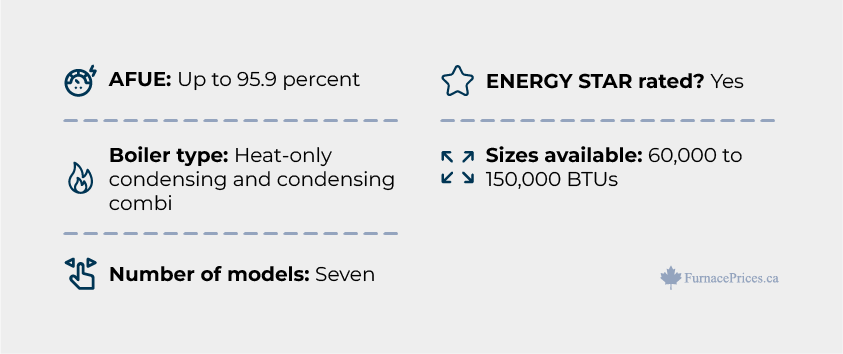
AFUE: Up to 95.9 percent
Boiler type: Heat-only condensing and condensing combi
ENERGY STAR rated? Yes
Sizes available: 60,000 to 150,000 BTUs
Number of models: Seven
What’s good: These are all affordable, high-efficiency, ENERGY STAR certified condensing boilers that are compact, have ultra-low NOx emissions, and that will optimize energy use to keep your home comfortable all winter.
M-SERIES
As with the I-Series, there are also heat-only and combi condensing boilers in the M-Series. These models boast easy and versatile installation, and the compact, wall-hung design makes them ideal for just about anywhere, no matter your space constraints, and no matter your fuel source. There are combi boilers in this series that can generate enough hot water to accommodate homes with up to three bathrooms, and every model promises quiet operation.
Every model is also ENERGY STAR certified, has ultra-low NOx emissions, and has a turndown ratio ranging from 3.5:1 to 6.9:1. The units in this series are equipped with stainless steel primary heat exchangers, modulating boiler pumps for improved efficiency and performance, and easy-to-use controls that make adjustments a breeze.
Boiler Stats
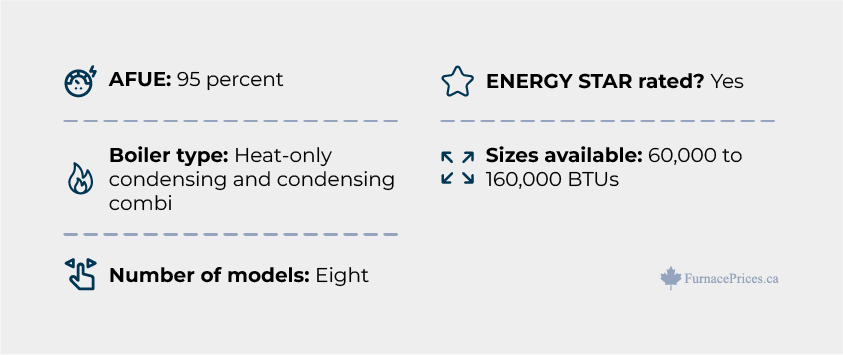
AFUE: 95 percent
Boiler type: Heat-only condensing and condensing combi
ENERGY STAR rated? Yes
Sizes available: 60,000 to 160,000 BTUs
Number of models: Eight
What’s good: M-Series boilers are high-efficiency, convertible, ENERGY STAR certified, quiet, compact, and easy to operate, install, and service, so you could save plenty on energy, setup, and maintenance costs.
Recently Discontinued Rinnai Boilers
The following boiler models have been discontinued by Rinnai. However, models may still be available from local HVAC companies for some time, so we’ll continue including them in this Rinnai boiler review.
E-SERIES
Boilers in Rinnai’s E-Series are heat-only models, but they’re still high-efficiency condensing boilers. Unlike the I-Series and M-series systems, the E-Series models aren’t convertible: they’re either made to work with natural gas or propane. The AFUE rating on these models ranges from 95.4 to 95.5 percent, and the entire series was awarded the ENERGY STAR Most Efficient mark back in 2016. The turndown ratio on some of these models isn’t quite as good, with some as low as 1.6:1 and others as high as 6.3:1.
They’re all equipped with a modulating pump, and all qualify as ultra-low NOx emissions, so they’re great for homeowners who want to save money and the environment. They also boast quiet operation, and are great for just about any space thanks to the compact design and flexible installation options.
Boilers Stats
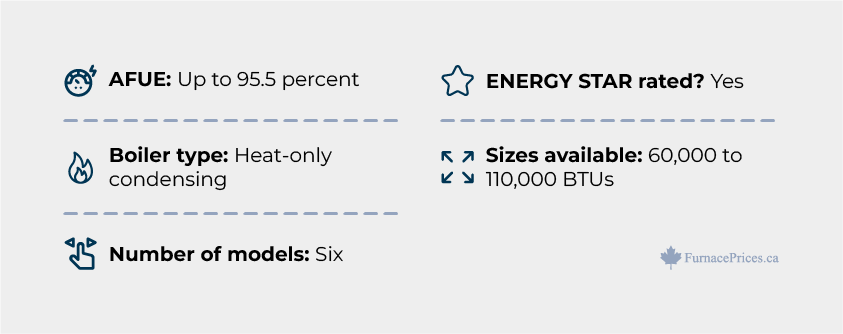
AFUE: Up to 95.5 percent
Boiler type: Heat-only condensing
ENERGY STAR rated? Yes
Sizes available: 60,000 to 110,000 BTUs
Number of models: Six
What’s good: The boilers in the E-SERIES are high-efficiency and eligible for energy-based rebates, and they promise easy installation and maintenance, user-friendly controls, and space-saving features.
Q-SERIES
The boilers in the Q-Series from Rinnai are condensing boilers like the others, but there are no combi models in this series. There are, however, gas, propane, and convertible models. Like Rinnai’s other home heating products, the Q-Series boilers are efficient, ENERGY STAR certified, rated for ultra-low NOx emissions, and have modulating pumps for better efficiency and performance.
These models also boast quiet operation, easy installation and servicing, versatile installation options suitable for just about any space, and AFUE ratings between 95 and 95.4 percent. Although it hasn’t been given the mark in recent years, this series was awarded the ENERGY STAR Most Efficient back in 2016.
Boiler Stats
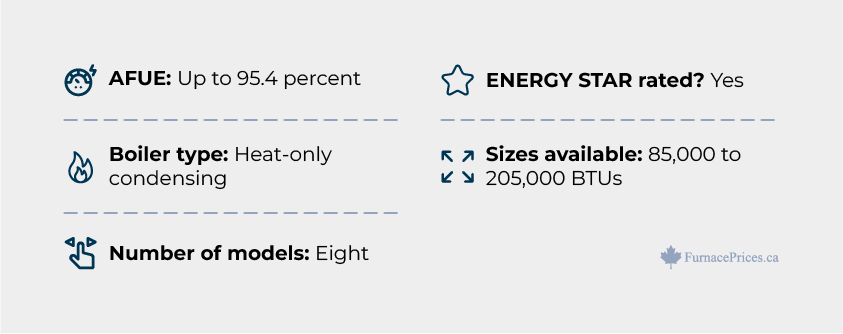
AFUE: Up to 95.4 percent
Boiler type: Heat-only condensing
ENERGY STAR rated? Yes
Sizes available: 85,000 to 205,000 BTUs
Number of models: Eight
What’s good: These condensing heat-only boilers are high-efficiency, equipped with user-friendly controls, have turndown ratios between 2.1:1 and 5:1, and are small and flexible enough for most home styles and sizes.
Get Quotes
How soon are you looking to buy?*



Rinnai Exclusive Features
Feature 1 –Simplified Installation
Every Rinnai boiler has been designed for fast and easy installation, and each one also offers flexible and versatile installation options. This is important for a few reasons. For one, easier installation can translate to lower setup and labour costs.
Beyond that, the flexible installation and compact design make Rinnai boilers perfect for almost any home. Here are the easy installation features of Rinnai boilers:
- Space-saving design
- Little assembly required
- Multiple venting options for different locations
- Outdoor reset sensors come pre-programmed
Feature 2 – Self-Cleaning Heat Exchanger
Self-cleaning heat exchangers are meant to be more durable, and therefore more reliable and lasting than conventional heat exchangers. The self-cleaning refers to a special design that allows for easy condensate drainage, and this keeps the component free of moisture.
Feature 3 – Outdoor Reset Sensors
Outdoor reset sensors improve both efficiency and comfort because they adjust the water temperature based on changes in the outdoor temperature. When the weather warms up, the water temperature inside the boiler will decrease so the boiler uses less energy while also keeping your home at the perfect temperature.
Rinnai’s Boiler Warranty

It’s understandable that most Canadians are primarily concerned with things like budget and efficiency when buying a new boiler, but you should also take a moment to think about warranties.
Modern boilers should generally last between 15 and 20 years, and it’s a good sign when an HVAC manufacturer stands behind their product with a warranty that lasts a decent portion of that time. A good warranty means the manufacturer expects the boiler to perform reliably for at least the duration of the warranty period, which is why it’s important for a Rinnai boiler review to cover warranty details.
Besides that, a warranty can save you money on parts, repairs, and even labour costs, depending on the brand. Rinnai boiler warranties are among the best in the industry, and that’s thanks to the labour warranty and the extended heat exchanger warranty. Let’s have a look at what Rinnai offers for warranty terms:
| Warranty Component | I-Series | M, E, and Q Series |
|---|---|---|
| Heat Exchanger | 12 years | 12 years |
| Parts | 5 years | 2 years |
| Labour | 1 year | 1 year |
RINNAI: ABOUT THE COMPANY
Let’s conclude our Rinnai review with a brief company bio.
Rinnai was founded in Japan back in 1920 as a manufacturer of tankless water heaters, and they’ve been operating in North America since 1974. Since then, they’ve become a household name across Canada for their quality-made, high-efficiency boilers, water heaters, and other HVAC products.
Today, their dedication to affordable, space-saving, and energy-efficient home heating and water heating products has secured their place as one of Canada’s most popular boiler and HVAC brands. Want to learn more about Rinnai’s high-efficiency natural gas and propane boiler line up?
Fill out our online form, and one of our representatives will be happy to provide you with a free, no-obligation quote.
Related Posts
-
A complete Navien boiler buying guide and brand review, including Navien’s top models, AFUE ratings,…
-
A complete Rheem boiler review and buying guide, including Rheem’s top models, AFUE ratings, features,…
-
A complete Viessmann boiler buying guide and brand review, including Viessmann’s top models, AFUE ratings,…
Get Quotes
How soon are you looking to buy?*




